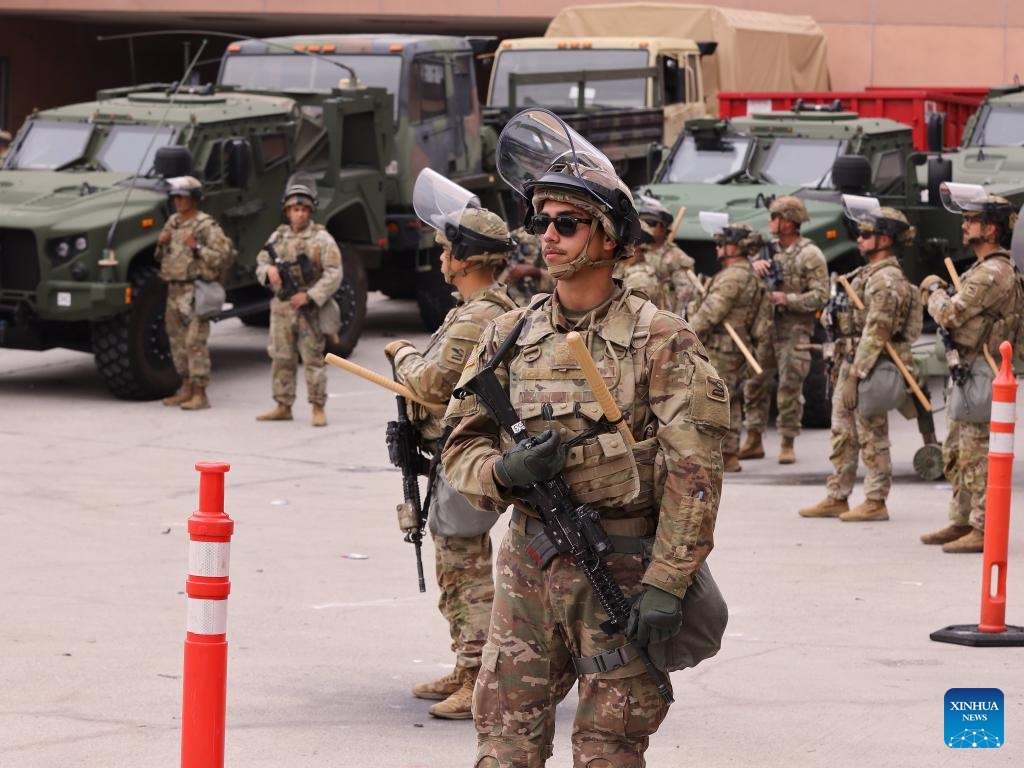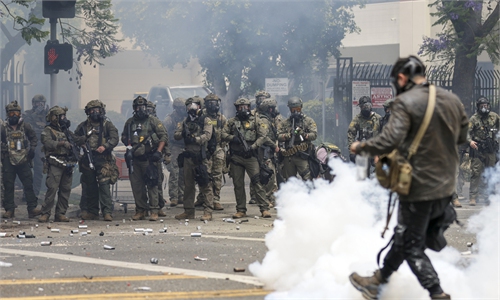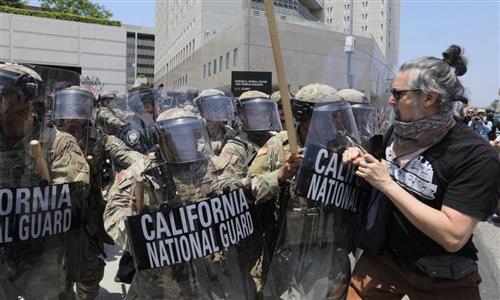
The California National Guard soldiers stand guard at the Los Angeles Federal Detention Center, in Los Angeles, California, the United States, June 8, 2025. More than 1,000 protesters clashed and faced off with National Guard troops in downtown Los Angeles on Sunday during the latest demonstrations against immigration raids that swept across California over the weekend. Photo: Xinhua
A US appeals court on Thursday allowed President Donald Trump to maintain his deployment of National Guard troops in Los Angeles amid protests over stepped-up immigration enforcement, temporarily pausing a lower court's ruling blocking the mobilization, Reuters reported on Thursday.
The decision by the 9th US Circuit Court of Appeals does not mean that the court will ultimately agree with Trump, but it means he will maintain command of the guard for now, according to Reuters. The court said it would hold a hearing on the matter on Tuesday, AP news reported.
A Chinese expert told the Global Times that the appeals court will handle it with caution and more time to make the final ruling, as the current incident involves the issue of presidential power.
The current result came after San Francisco-based US District Judge Charles Breyer ordered the National Guard to return to the control of California Governor Gavin Newsom, who sued to restrict its activity. Breyer found that Trump's deployment of the Guard was unlawful, per Reuters.
President Trump's "actions were illegal - both exceeding the scope of his statutory authority and violating the Tenth Amendment to the United States Constitution," Judge Breyer wrote. "He must therefore return control of the California National Guard to the governor of the state of California forthwith," The New York Times reported on Thursday.
The Trump administration then wasted no time in asking the US Court of Appeals for the 9th Circuit to quickly block Breyer's ruling, per CNN.
Following the decision allowing Trump to maintain his deployment of National Guard troops for now, Trump wrote on his Truth Social account on Friday, "If I didn't send the Military into Los Angeles, that city would be burning to the ground right now… Thank you for the Decision."
It was the first time in 60 years that a president had activated a state's National Guard over the objections of the state's governor, NPR reported.
To send thousands of National Guardsmen to Los Angeles, Trump invoked Section 12406 of Title 10 of the US Code, according to ABC News. The statute allows the president to call on federal service members when there "is a rebellion or danger of rebellion against the authority of the Government of the US" or when "the President is unable with the regular forces to execute the laws of the US."
However, "the protests in Los Angeles fall far short of rebellion," Breyer wrote, adding that even when protests involved violence, there was not "evidence that any of the violent protesters were attempting to overthrow the government as a whole," NPR said.
The appeals court won't make a decision immediately, as the current incident involves the issue of presidential power. They will handle it with caution and more time, hold a hearing, and then make a ruling, Lü Xiang, a research fellow at the Chinese Academy of Social Sciences, told the Global Times on Friday.
The court's action, called an administrative stay, gives the appeals judges additional time to consider the Trump administration's request to block Breyer's order while litigation in the case continues, Reuters also reported.
The expert noted that the likelihood of the case being accepted by the Supreme Court is not very high, as the court hears only a small fraction of cases every year. He also added that the court's stance on fully supporting Trump's side is uncertain but from his perspective is unlikely.


